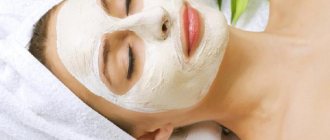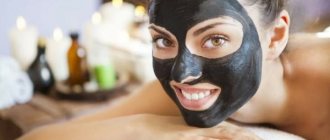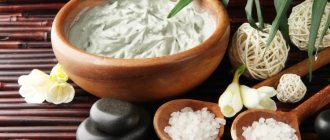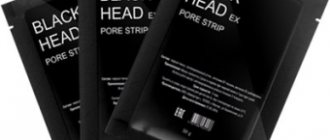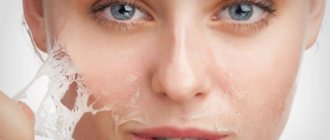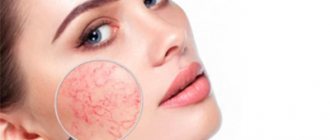Updated: 06.22.2021 Cosmetic clay masks are again at the peak of popularity, and deservedly so. Clay is a unique natural substance that is rich in calcium, magnesium, iron, nitrogen, potassium and other trace elements, as well as mineral salts.
The unique properties are due to the specific structure of the substance - it consists of a large number of small plates superimposed on each other, like tiles on a roof. It turns out that the clay particles are small in size, but have a large surface area. Therefore, they adsorb dirt and excess sebum well, tighten pores, stimulate blood flow to the upper layers of the epidermis and accelerate cell renewal.
There are several varieties of clay that are widely used in cosmetology, as their effectiveness is not inferior to expensive products. Each type of clay has its own characteristics, let’s look at the main ones.
- Blue clay.
Suitable for oily and combination skin, it has smoothing and softening effects, helps in the fight against acne, and relieves inflammation. - White clay.
Penetrates deeply into the layers of the epidermis, evening out the complexion and eliminating small wrinkles. White clay masks effectively cleanse impurities and dry out oily skin. Due to its strong drying effect, it is not recommended for dry skin. - Yellow clay.
Cleanses the skin well, tightens the oval of the face, and is able to remove toxins. - Pink clay.
Suitable for sensitive skin, eliminates inflammation, redness and small wrinkles, maintains elasticity, and has a softening effect. The pink color is achieved by mixing white and red types of clay. - Green clay.
Optimizes the functioning of the sebaceous glands, eliminates inflammation and flaking, nourishes and tones the skin, and reduces pores. - Black clay.
Improves blood circulation and metabolism in cells, suitable for oily and dry (combination) skin. The mask evens out the complexion and has a mattifying effect.
We present the rating of face clays 2022. The best 12 products that were selected by our experts based on user reviews and ratings.
| Rating (2021) | Prices, ₽ | A country |
| 1. DNC White | from 60₽ | Russia |
| 2. Fito cosmetics blue Cambrian | from 30₽ | Russia |
| 3. Medicomed Blue cosmetic | from 35₽ | Russia |
| 4. Folk recipes black Kamchatka volcanic cleansing | from 90₽ | Russia |
| 5. Fito cosmetics pink Egyptian moisturizing | from 40₽ | Russia |
| 6. Goat Dereza Black Kamchatka | from 120₽ | Russia |
| 7. DNC Green | from 60₽ | Russia |
| 8. BioAqua cleansing oxygen bubble based on clay | from 230₽ | China |
| 9. L'Oreal Paris Magic Clay Detox and radiance | from 180₽ | France |
| 10. Eunyul Clean & Fresh to improve skin elasticity | from 115₽ | South Korea |
| 11. DerMeiren Wash off Pore Tightening Mud Mask | from 110₽ | South Korea |
| 12. Cafe mimi Clear skin Blue clay and Sage | from 140₽ | Russia |
Which facial clay is best to buy?
As can be seen from the rating, clay masks can solve various problems with facial skin. Manufacturers offer both pure clay powder, from which you need to make a mixture yourself, and ready-made masks for skin care. These products are quite effective, and most importantly, the result is almost always noticeable after the first use.
The cost is suitable for any consumer - masks are presented in different price segments. Some products can be used not only for the skin of the face, they are also applied to the hair or body - clay promotes healthy skin, has a rejuvenating effect, and strengthens hair. Let's pay attention to some criteria that should be taken into account before purchasing.
- Skin type.
This is the main indicator when choosing clay. Those with dry skin should be especially careful, as masks have a drying effect. However, manufacturers supplement the composition with moisturizing and nourishing components to avoid tightness. It is possible to use different types of clay on different areas of the skin, for example, one type of clay is applied to the T-zone, and a mask with a more gentle effect is applied to drier and more sensitive areas. - Compound.
It all depends on the needs of your skin. Does she need a combined effect or is a clay mask in its pure form sufficient? - Mode of application.
Are you ready to create a mask with your own hands or is it more convenient for you when it is presented in finished form? Any option is suitable for home use, but for trips and trips it is better to purchase a ready-made product that you simply apply to the skin. - Packaging parameters
. Please note that clay in powder form is additionally diluted with water. Therefore, the package will yield at least twice as much product ready for application. Manufacturers offer clay in packages of different sizes, some are convenient for use at home, while others will become indispensable travel companions. If the package is intended for more than one use, consider whether the printed product can be tightly sealed. - Manufacturer.
Of course, it is better to contact trusted manufacturers and buy products in specialized stores. This way you can be sure that you have not purchased a fake, but a really good and effective product.
We hope our rating has expanded your knowledge about clay masks and you were able to choose the best product for your skin.
Successful purchase and effective results! Thanks to All.ru in Yandex Zen. Daily updates, subscribe, we have a lot of interesting things
Daily updates, subscribe, we have a lot of interesting things
How to use a clay mask
To understand how long to keep a clay mask on your face, focus on your skin type.
If you have combination or oily skin, use the mask once a week, apply for 10-15 minutes. If the skin is dry or sensitive - no more than twice a month, for only 5-7 minutes. At the same time, make sure that the mask does not dry out completely on your face - moisturize it with a mist.
- Remove makeup with micellar water or hydrophilic products. Then cleanse your skin with your favorite foam or gel wash. If possible, you can steam your face before applying the mask to open the pores.
- Avoiding the area around the eyes (the skin of the eyelids is too thin and sensitive) and lips, apply the product in a thick, opaque layer. Many people do not know how best to apply a clay mask to their face. It is much more convenient to do this with a special brush - this way you get a perfect even layer

- After the specified time, rinse off the mask with warm water.
- Apply moisturizer to seal the effect and not dry out the skin.
Multimasking with pink and black clay for combination skin. 160 ₽
White
This is the main type of rock used in cosmetology to treat oily and problem skin. White clay consists almost entirely of kaolinite, which includes aluminum oxide, silicon dioxide, and water.
It looks like a white powder with a milky yellowish or creamy tint.
Kaolin produces the following effects:
- absorbs sebum
- dries out
- cleanses pores,
- mattifies,
- additionally &mdash, tones, nourishes, smoothes.
Morning cleansing soap
- clay (hereinafter we mean the drug in powder form) &mdash, 100 g,
- soda, pharmaceutical boric acid (powder) &mdash, 1 tsp of each ingredient.
The products are mixed and transferred to a dry container. In the morning, take a pinch of the mixture, add water, stir to form a paste. Moisten and lather your face with clay, leave for 2 minutes. Then they wash their face, use a tonic, then a moisturizing cream for oily skin. This will normalize fat secretion, cleanse pores, and reduce inflammation.
Yellow
The composition, in addition to kaolin, includes sodium, sulfur and their compounds, as well as ferric iron and potassium. Yellow clay:
- destroys pathogenic bacteria that abound in oily skin,
- saturates tissues with oxygen,
- restores elasticity when fading,
- reduces the depth of wrinkles,
- softens.
A special feature of applications made from yellow clay is that they are not allowed to dry out on the skin.
Mask for high fat content
To prepare it take:
- kaolin &mdash, 2 tsp.,
- bee honey, lemon juice, natural apple vinegar, 1 tsp each.
The components are mixed, water is added as needed to achieve sour cream thickness and homogeneity. The application lasts 10 minutes, then wash.
How to choose cosmetic clay for dry skin: which one is suitable
The varieties of cosmetic clay presented on store shelves differ not only in color, but also in the effect they have on the skin of the face. So, for oily or combination skin types, masks with a drying effect are suitable, while for dry skin such products are strictly contraindicated by cosmetologists. For sensitive epidermis, clay with a matting effect is recommended to be used exclusively in diluted form. Therefore, you need to choose the right clay for your skin type, otherwise it may cause irritation or have the opposite effect.
To do this, add to the masks:
- nourishing oils;
- herbal decoctions;
- chopped fruits;
- dairy products;
- honey;
- egg yolk.
Pink and red clays provide the most gentle care for dry skin. Both types are distinguished by their delicate consistency, due to which the delicate removal of keratinized epithelial cells occurs.
Pink clay has a regenerating effect, increases blood flow in the tissues of the skin, thereby saturating the skin with essential nutrients and oxygen.
White, green and blue cosmetic clays can be applied in diluted form. Such products affect the production of the sebaceous glands, thereby reducing the amount of sebum secreted.
On oily or combination skin types, products with a similar effect work much better than on dry, flaky skin. That is why, before using clay with a drying effect, it is additionally diluted with various natural ingredients or oils. You can find out which facial clay is the most effective here.
When giving preference to one type or another, do not forget to take into account two important factors:
- Clay deposit. The area where the rock was mined must comply with environmental standards. Only clay that does not contain harmful toxic substances and heavy metals will be useful.
- Composition of the product. Some manufacturers make the mistake of producing low-quality clay, giving the powder the desired shade using various chemical dyes. Such products not only cause harm, but also stain the skin, after which it is necessary to cleanse the face in other additional ways.
Pay special attention to the composition of the clay from which you make cosmetics.
White
White clay, or, as it is also called, kaolin, is used primarily in the care of oily skin. Dry bluish or yellow powder is mixed with a small amount of water to obtain a plastic, creamy consistency.
White clay has a beneficial effect on mature skin. Homemade masks based on kaolin and nourishing oils well moisturize the epidermis, thereby helping to smooth out fine expression wrinkles. The whitening effect of white clay allows you to get rid of age spots in the shortest possible time, and the rich silicon content promotes increased collagen production in the upper layers of the dermis.
White clay cleanses pores of impurities, relieves inflammation, and effectively whitens red spots after acne.
Clay masks should not be left on dry facial skin until completely dry. Otherwise, the mask will take all the moisture from the epithelium and dry out sensitive skin even more. To prevent the clay from hardening during the procedure, periodically spray your face with thermal water or any hydrosol.
Red
The soft texture of the mask is very gentle on dry skin. Red clay perfectly relieves redness, eliminates itching, flaking and gives the face a healthy, radiant appearance. The powder contains a large amount of copper and iron, which have an intense restorative effect.
Unlike other types, red clay does not dry out the sensitive epidermis, which is prone to flaking.
Red clay perfectly cleanses accumulated impurities, removes dead cells and has a pronounced antiseptic effect.
Pink
It is obtained by mixing white and red clay. These masks effectively fight the first signs of aging thanks to the rich content of kaolinite, illite and calcium. You can learn about the properties and uses of pink clay in this material.
A successful combination of two powders is used as a delicate scrub. Clay peeling cleanses clogged pores, thereby eliminating problematic skin from comedones, blackheads, and various skin rashes.
Masks based on pink clay tone the skin well and affect blood flow in the upper layers.
Green
It affects very deep layers of the dermis, resulting in thorough cleansing of the skin. Green clay is very popular in cosmetology. You can learn more about the properties and uses of green clay here.
Green clay masks demonstrate several effects at once:
- tighten aging mature skin;
- intensively nourish dehydrated epidermal cells;
- have a tonic effect.
The healing properties of green clay allow you to restore the natural hydrolipid balance of the skin, nourish cells with useful substances and smooth out fine wrinkles.
Cosmetic clay should not be diluted in metal containers. During the mixing process, the metal reacts with the powder, which negatively affects the subsequent effect of the cosmetic procedure.
Gray
Based on gray clay, various masks and creams are produced that have a pronounced lifting effect. Systematic use of such products promotes skin rejuvenation, relieves puffiness and improves complexion. The delicate consistency of gray clay absolutely painlessly cleanses the skin of impurities, and the potassium and zinc contained in it help actively remove harmful toxins.
Despite this, gray clay has managed to gain popularity in the cosmetology industry due to its concentrated composition and effective anti-aging effect.
Gray clay is considered the rarest type, since the rock is mined at the bottom of the sea.
Yellow
It got its name due to the yellow tint of the rock, which was formed due to the presence of potassium and iron in the composition. These microelements have pronounced antioxidant properties and also remove toxic substances from epidermal cells.
Yellow clay is suitable not only for dry sensitive skin, but also for oily skin due to its bactericidal, antiseptic and wound-healing effects on the dermis. This product perfectly moisturizes dehydrated epithelial cells, and its pronounced regenerating properties help fight microcracks, peeling and redness of the skin. Find out about the properties and uses of yellow clay by following the link.
Yellow clay has a tonic effect.
Blue
The blue color comes from silver molecules, which act as an anti-inflammatory and disinfectant. In part, it took over the properties of white clay, as well as blue, which stimulates cell regeneration.
The composition includes cadmium, cobalt, including in the form of salts, silicon, magnesium, iron, and other minerals.
Cleansing mask
The product first opens and then cleanses pores and gets rid of oily shine. First, grind the rice into powder using a coffee grinder. Then take clay and rice powder in equal parts, add water, and dilute it to the consistency of sour cream. The mixture is left for a quarter of an hour and removed with warm water.
Recommendations for use
As previously mentioned, clay does not cause allergies, so it can be used by everyone. But the masks contain various components. It may turn out that you are allergic to one of them. Therefore, carefully consider the composition of the mask before applying it to your own face. Make sure that you do not have an individual intolerance to any component of the recipe.
To do this, check the composition in the standard way. Apply the components to a small area of the elbow in advance. Leave on for half an hour, then rinse off. If no reaction is detected after a day, the mask can be used.
Remember that although masks with clay are effective, you should not limit yourself to them. Watch your diet and choose the right skincare products to reduce the appearance of oily shine and get rid of rashes.
conclusions
- Clay masks at home are an effective remedy for combating imperfections in oily skin.
- For oily skin, white, yellow, green and blue clays are best suited.
- This cosmetic product does not cause allergies, so anyone can use it.
- However, before using the mask, make sure that you are not allergic to its other components.
- Never prepare a mask mixture in a metal container.
- Do not let the clay dry on the skin, otherwise you will get the opposite effect from using it.
- In addition to using cosmetic clay, do not forget to monitor the condition of your skin in other ways: eat right, choose high-quality cosmetics.
How is it good for the skin?
Clay, regardless of color, is an excellent absorbent that cleanses of toxins, fights pathogenic microbes , when taken orally, improves the blood formula, activates metabolism. Other effects include:
- whitens,
- tones,
- nourishes
- rejuvenates.
What explains this action of the rock? One of the inherent properties of &mdash is ion exchange.
The ions contained in clay bind cations of excess substances that cause the development of dermatological defects.
Clay also consists entirely of a tiny mixture of minerals, which determine its color and determine its beneficial properties and effects. Which clay is suitable for oily skin? Next - about the varieties that help cope with the imperfections of oily skin, and recipes for masks.
With banana and rose water
Grate the cucumbers on a fine grater and dilute the mixture to the desired consistency.
Pink clay is very soft, making it suitable for sensitive or dry skin. Tones, softens, smoothes wrinkles and prevents skin aging.
Let's make a nourishing mask for dry skin with pink clay, which will return healthy color, strength and energy to it.
- Ingredients
- half a banana
- pink water;
- almond or peach oil;
honey (optional).
To dilute, use natural rose water or other hydrosol. Add carefully crushed banana mousse to the resulting mass.

